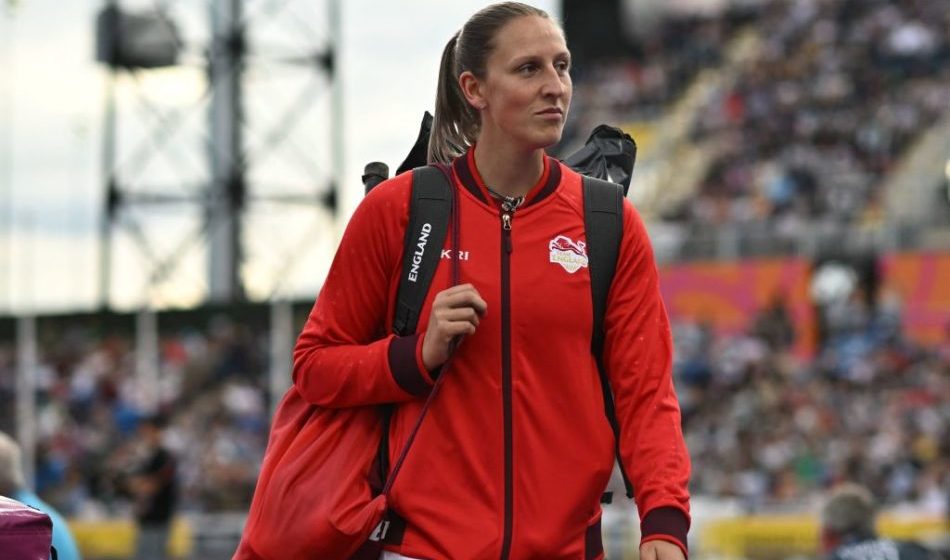
Olympic pole vault medallist admits she struggled after the highs of Tokyo and explains why she wants to see athletes receiving help in dealing with the Games experience
For some athletes, 2022 offered the chance to follow up the Tokyo Olympics in spectacular style. For others, however, things have not been quite so straightforward.
When Holly Bradshaw returned from Japan with a bronze medal, it was the culmination of years of hard work. It represented reaching the pinnacle of her sport. The strange thing was that, when she came home, the British pole vault record-holder found herself lacking in energy and motivation.
She recalls the autumn of 2021: I achieved something that I wanted to achieve my whole life but, when I returned home, I had no energy and felt down for a good few months.
I would just lie on the sofa and get upset for no reason, which is not like me at all. My husband would say: Whats wrong? And I couldnt tell him because I didnt know anything was wrong and I couldnt explain it.
Holly Bradshaw (Mark Shearman)
Bradshaw was recovering from glandular fever but also thinks she was suffering from post-Olympic blues and is determined to help others understand it and see safeguards put in place.
Her interest in the subject resulted in the publication of an academic paper* which starts: The post-Olympic period is complex and distressing for many Olympic athletes; preparing for the likely impacts of the Olympic Games amongst returning athletes is fundamental in managing the negative responses articulated as the post-Olympic blues.
While an Olympic pole vault competition is, at face value, no different from a World Championships, the hype surrounding it takes things to a new level and creates way more pressure on the athlete.
There is, what researchers have called, the celebritisation of Olympic athletes, in a way that does not happen with the World Championships. The Olympics is always in the news. Everything seems to be about the Olympics. Athletes are invited to a kitting-out ceremony to receive the full range of GB logoed clothing, while individual sponsors make a fuss of the athletes and at the Games they receive gifts.
Loads of things are thrown at you to make you feel special, says Bradshaw, whose 2022 was blighted by injury. You feel that youre part of something really special and that is great. But then there is that stark comparison when you come home and you have nothing. And that is difficult for athletes.
My experience, and that of a lot of other athletes I think, is constantly hearing youre amazing, you are special, going to the Olympics and then the day you get home and its nothing no support.
Holly Bradshaw celebrates in Tokyo (Getty)
There is also what has been called the commodification of athletes. At the Rio Olympics, Bradshaw came fifth but felt like she was a failure or, rather, felt that other people saw her as such.
I felt Id done a really good job finishing fifth and I was really happy but it seemed that nobody really cared. No one said well done, amazing effort or anything like that. I felt I came home to being a failure because I didnt win a medal.
For me, that was really hard because I thought Id done a good job. We all know that everyone wants to go out and do a PB and win a medal but that need not be your sole goal. And for me, changing that mentality to Im doing it because I love it. Im doing it because its fun has helped me to be happier and to stay in the sport.
It is in the culture of sport that you are there to win and that is hammered home. But there are not many organisations out there which promote an intrinsic culture. Some sports have a what it takes to win model and I think thats whats wrong with sport. Perhaps a better motto would be be the best prepared, the best supported athletes out there.
In the paper, Bradshaw cites the example of seats on the plane home from the Olympics being allocated by performance, with medal winners at the front and losers at the back even if those losers had achieved a PB or reached the final of their events as something which sends the wrong message about what sport is about.
One of Bradshaws suggestions is the appointment of a welfare or care officer, there with the sole goal of ensuring that everyone is okay. Someone to support people but not in a sports psychology capacity but just as someone who could listen, support and give advice. This was tried at the Beijing Winter Olympics.
Holly Bradshaw (Mark Shearman)
Bradshaw also feels it is important that the care officer is not the team sports psychologist. Her research found that a lot of athletes were very hesitant about speaking to the team psychologist because they were wondering is this conversation confidential or will it be fed back to management?
Bradshaw also believes more use could be made of former athletes in supportive or mentoring roles. For example, former European champion, James Dasaolu has just retired. He could be a help to young up and coming sprinters, she says.
I would love to see an organised peer to peer athlete support group with the involvement of British Athletics and with some investment. I think it was Roger Black who recently said in AW that he doesnt understand why he has never been asked to help.
